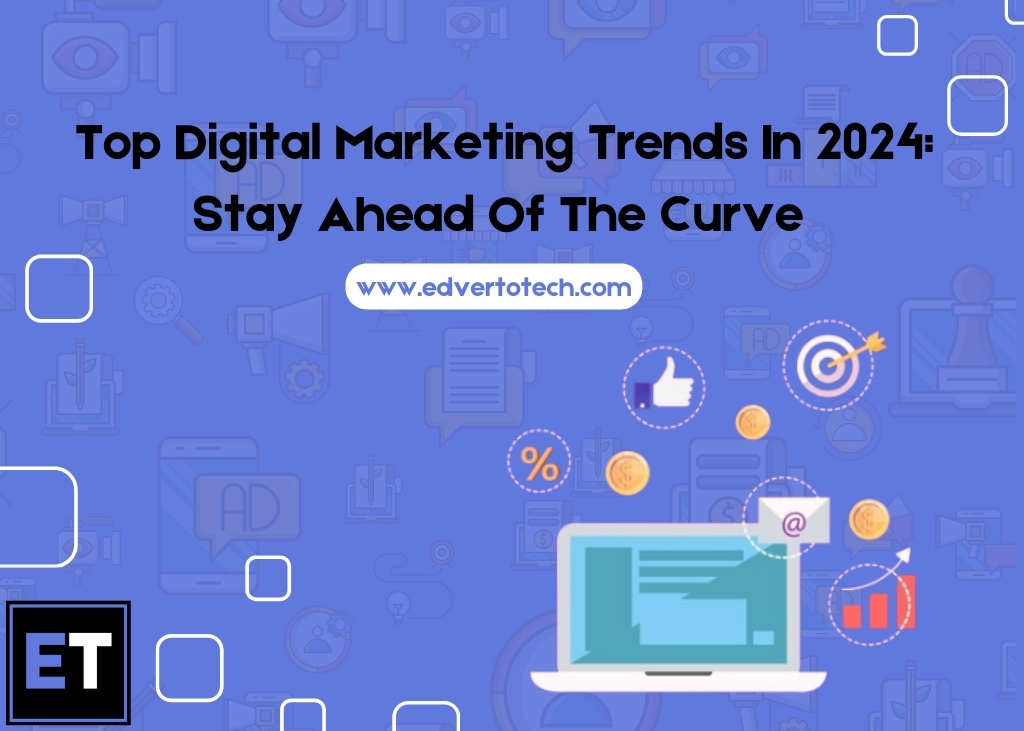As the digital world continues to change rapidly, businesses need to stay updated to maintain a competitive edge. In 2024, several key trends are expected to dominate digital marketing. From advancements in artificial intelligence to the increasing focus on data privacy, these trends are shaping the future of how brands connect with their audiences. Here’s a comprehensive look at the top digital marketing trends in 2024.
Artificial Intelligence and Machine Learning
Artificial intelligence (AI) and machine learning (ML) are transforming the digital landscape. AI in digital marketing helps marketers analyze huge amounts of data, predict consumer behaviour, and personalize customer experiences like never before.
➤ AI-Powered Personalization
AI-powered personalization uses data and algorithms to deliver customized content and product recommendations to users. In 2024, more businesses will use AI to create highly personalized marketing campaigns that resonate with individual customers. This approach not only boosts user engagement but also increases conversion rates.
➤ Chatbots and Virtual Assistants
Chatbots and virtual assistants, powered by AI, are becoming more advanced. These tools provide instant customer support, answer questions, and guide users through their buying journey. The use of AI in customer service improves response times and enhances user satisfaction.
Voice Search Optimization
With the rise of smart speakers and voice-activated devices, voice search queries are increasing. In 2024, voice search optimization will be more important than ever.
➤ Natural Language Processing
Natural Language Processing (NLP) technology helps search engines understand and process human language better. Marketers need to focus on long-tail keywords and conversational phrases that mimic natural speech. Creating content that answers common voice search queries will improve visibility in voice search results.
➤ Local SEO for Voice Search
Voice searches are often location-specific. Businesses should ensure their local SEO is optimized, including claiming and updating their Google My Business listings. Providing accurate business information and optimizing for local keywords can significantly boost visibility in voice search results.
Video Marketing Dominance
Video content continues to dominate digital marketing. With platforms like YouTube, TikTok, and Instagram Reels becoming increasingly popular, integrating video into marketing strategies is essential.
➤ Short-Form Videos
Short-form videos are highly engaging and shareable, making them perfect for capturing the audience’s attention quickly. In 2024, expect brands to create more bite-sized, impactful video content tailored to various social media platforms.
➤ Live Streaming
Live streaming offers real-time interaction with audiences, fostering a sense of community and authenticity. Brands are using live streaming for product launches, Q&A sessions, and behind-the-scenes content. This trend is set to grow, providing opportunities for real-time engagement and feedback.
Social Commerce
Social commerce, the integration of e-commerce with social media platforms, is transforming the online shopping experience. Platforms like Instagram, Facebook, and TikTok are enhancing their shopping features, allowing users to purchase products directly from their social media feeds.
➤ Shoppable Posts
Shoppable posts let users click on a product within a social media post and be directed to a purchase page. This seamless integration makes it easier for consumers to shop and for brands to drive sales.
➤ Influencer Partnerships
Influencers play a crucial role in social commerce. Collaborating with influencers who align with a brand’s values and target audience can amplify reach and drive conversions. In 2024, expect more brands to leverage influencer partnerships to enhance their social commerce strategies.
Privacy and Data Security
With growing concerns about data privacy, consumers are becoming more cautious about how their personal information is used. In 2024, brands must prioritize data privacy in marketing and transparency to build trust with their audience.
➤ Compliance with Privacy Regulations
Regulations like the General Data Protection Regulation (GDPR) and the California Consumer Privacy Act (CCPA) have set strict guidelines for data collection and usage. Businesses need to ensure compliance with these regulations to avoid penalties and maintain consumer trust.
➤ Transparent Data Practices
Being transparent about data collection and usage practices is crucial. Brands should communicate how they collect, store, and use customer data. Providing options for users to control their data can enhance trust and loyalty.
Augmented Reality (AR) and Virtual Reality (VR)
AR and VR in marketing provide immersive experiences that engage users in unique ways. These technologies are being increasingly integrated into digital marketing strategies.
➤ AR for Product Visualization
AR allows customers to visualize products in their real-world environment before making a purchase. This technology is particularly beneficial for industries like fashion, home decor, and automotive, where seeing the product in context can influence buying decisions.
➤ VR for Experiential Marketing
VR offers immersive experiences that can transport users to virtual environments. Brands are using VR for experiential marketing campaigns, virtual tours, and interactive storytelling. This trend is expected to grow as VR technology becomes more accessible.
Sustainability and Social Responsibility
Consumers are becoming more conscious of the environmental and social impact of their purchases. Brands that demonstrate a commitment to sustainability and social responsibility are likely to resonate more with their audience in 2024.
➤ Eco-Friendly Practices
Incorporating eco-friendly practices into business operations and marketing strategies can attract environmentally conscious consumers. Highlighting sustainable products, reducing carbon footprints, and supporting green initiatives are ways brands can showcase their commitment to the environment.
➤ Social Impact Initiatives
Brands that actively participate in social impact initiatives, such as supporting local communities, promoting diversity and inclusion, and contributing to charitable causes, can build stronger connections with their audience.
Interactive Content
Interactive content, such as quizzes, polls, and interactive infographics, engages users more effectively than static content. In 2024, incorporating interactive elements into digital marketing strategies can boost engagement and drive conversions.
➤ Gamification
Gamification involves adding game-like elements to non-gaming contexts to increase user engagement. Brands can use gamification in their marketing campaigns to create fun and interactive experiences, encouraging users to participate and share.
➤ Interactive Videos
Interactive videos allow viewers to interact with the content, making the experience more engaging. Features like clickable hotspots, branching scenarios, and interactive storytelling can keep viewers engaged and increase the time spent on the content.
Conclusion
The digital marketing landscape in 2024 is set to be shaped by advancements in technology, shifts in consumer behaviour, and an increased focus on privacy and sustainability. By staying abreast of these trends and adapting their strategies accordingly, businesses can effectively connect with their audience, build trust, and drive growth.
Embracing AI, optimizing for voice search, leveraging video content, and prioritizing data security are just a few of the ways brands can stay ahead in the ever-evolving world of digital marketing.


